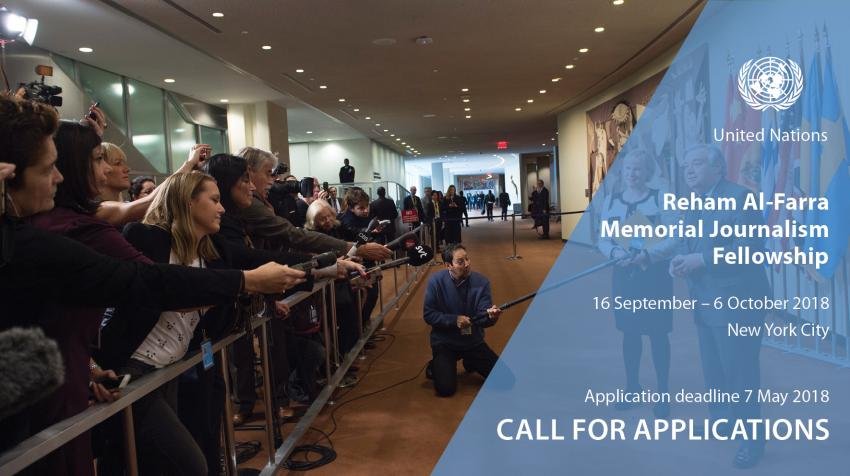
Deadline: 7 May 2018.
The Reham Al-Farra Memorial Journalism Fellowship is a unique opportunity for young journalists from developing countries and countries with economies in transition to cover the United Nations. Hosted every fall at UN Headquarters, the programme brings a select group of journalists to New York for the opening of the General Assembly.
During the 3-week programme, fellows have an opportunity to attend special briefings, interview senior officials and exchange ideas with colleagues from around the world. In previous years, fellows have met with the UN Secretary-General, President of the General Assembly and permanent representatives to the United Nations. The programme also arranges visits to various news organizations, such as the New York Times, Democracy Now! and WNYC radio.
The Reham Al-Farra Memorial Journalism Fellowship was mandated in December 1980 by UN General Assembly Resolution 35/201. Formerly known as the DPI Training Programme for Broadcasters and Journalists from Developing Countries, the programme was renamed in 2003 in honor of Reham Al-Farra, a 29-year-old Jordanian public information officer who was killed in the 19 August 2003 bombing of the UN headquarters in Baghdad.
Since its founding in 1981, the fellowship has been awarded to 581 journalists from 168 countries. Upon completion of the programme, fellows are expected to continue working in journalism and promote better understanding of the United Nations in their home countries. The programme does not provide basic skills training, as all fellows are working journalists.
Benefits:
The Fellowship covers travel to New York and provides a daily subsistence allowance to cover accommodation and related expenses.
To meet the eligibility requirements, candidates must:
- be between 22 and 35 years old
- be a fulltime working journalist
- be proficient in English
- possess a passport valid for at least 6 months beyond the start of the Programme (programme begins September 2018)
- be a national of a developing country or country in transition, as defined by the UN Department of Economic and Social Affairs:
Afghanistan, Albania, Algeria, Angola, Antigua and Barbuda, Argentina, Armenia, Azerbaijan, Bahamas, Bahrain, Bangladesh, Barbados, Belarus, Belize, Benin, Bhutan, Bolivia, Bosnia and Herzegovina, Botswana, Brazil, Brunei Darussalam, Burkina Faso, Burundi, Cabo Verde, Cambodia, Cameroon, Central African Republic, Chad, Chile, China, Colombia, Comoros, Congo, Cote d’Ivoire, Cuba, Cyprus, Democratic Republic of Congo, Djibouti, Dominica, Dominican Republic, Ecuador, Egypt, El Salvador, Equatorial Guinea, Eritrea, Ethiopia, Fiji, Gabon, Gambia, Georgia, Ghana, Grenada, Guatemala, Guinea, Guinea-Bissau, Guyana, Haiti, Honduras, India, Indonesia, Iran, Iraq, Israel, Jamaica, Jordan, Kazakhstan, Kenya, Kiribati, Kuwait, Kyrgyzstan, Lao, Lebanon, Lesotho, Liberia, Libya, Macedonia, Madagascar, Malawi, Malaysia, Maldives, Mali, Marshall Islands, Mauritania, Mauritius, Mexico, Micronesia, Moldova, Mongolia, Montenegro, Morocco, Mozambique, Myanmar, Namibia, Nauru, Nepal, Nicaragua, Niger, Nigeria, Oman, Pakistan, Palau, Palestine (State of), Panama, Papua New Guinea, Paraguay, Peru, Philippines, Qatar, Republic of Korea, Russia, Rwanda, Saint Kitts and Nevis, Saint Lucia, Saint Vincent and the Grenadines, Samoa, Sao Tome and Principe, Saudi Arabia, Senegal, Serbia, Seychelles, Sierra Leone, Singapore, Solomon Islands, Somalia, South Africa, South Sudan, Sri Lanka, Sudan, Suriname, Swaziland, Syria, Tajikistan, Tanzania, Thailand, Timor-Leste, Togo, Tonga, Trinidad and Tobago, Tunisia, Turkey, Turkmenistan, Tuvalu, Uganda, Ukraine, United Arab Emirates, Uruguay, Uzbekistan, Vanuatu, Venezuela, Viet Nam, Yemen, Zambia, Zimbabwe


